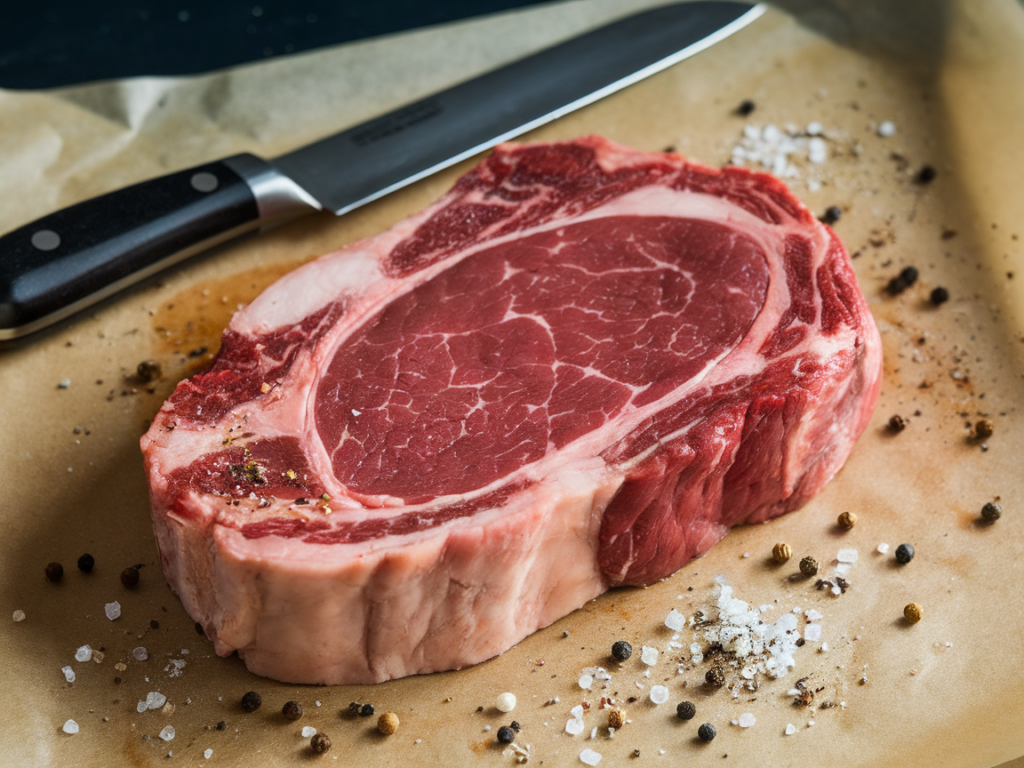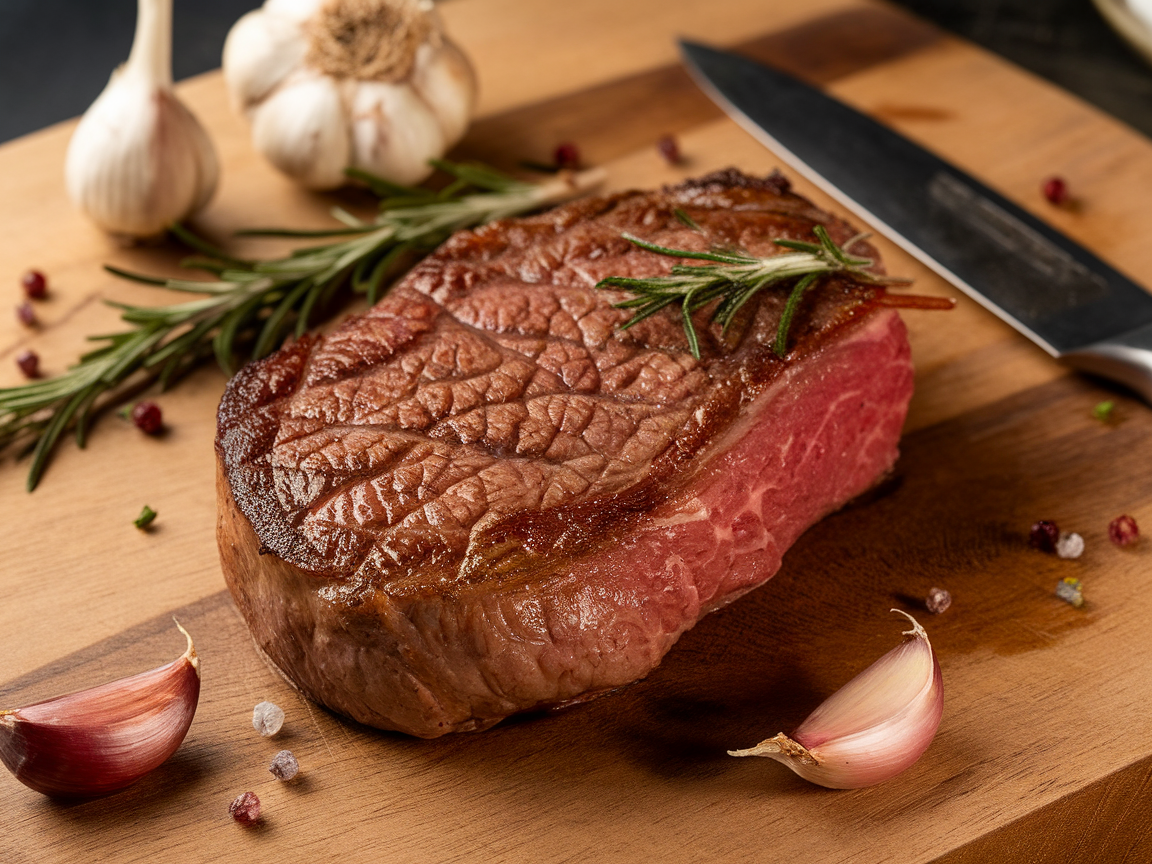Understanding the Baseball Steak
Have you ever come across the term “baseball steak” and wondered, What is another name for a baseball steak? 🥩 Don’t worry—you’re not alone. The baseball steak, also known as the center-cut top sirloin, is a thick, juicy cut of beef prized for its tenderness and rich flavor. It gets its unique name because of its round, plump shape, resembling a baseball when cooked.
What is Another Name for a Baseball Steak?

Have you ever come across the term “baseball steak” and thought, What kind of cut is that? 🥩 Don’t worry—you’re not alone. The baseball steak is a thick, juicy cut of beef, prized for its tenderness and rich flavor. It gets its unique name because of its round, plump shape, resembling a baseball when cooked. Unlike some other cuts, it doesn’t flatten out much, so it holds its rounded, beefy look, especially when cooked to perfection.
This steak is cut from the center of the top sirloin, making it lean but flavorful. It’s often associated with high-end dining but is simple enough to prepare at home with the right techniques.
Why Do People Call It a Baseball Steak?
The name isn’t some fancy culinary jargon—it’s pretty literal! When cooked, the steak puffs up like a baseball, thanks to the way the heat interacts with the muscle fibers in this particular cut. It’s fun to say and even more delightful to eat. Many people ask, What is another name for a baseball steak? The answer often depends on where you are and who you ask. Some call it the center-cut top sirloin, while others know it as a sirloin filet or baseball cut steak.
“The baseball steak isn’t just a piece of meat; it’s a culinary experience, combining simplicity and elegance on your plate.”
Other Popular Names for This Cut
Common Synonyms for Baseball Steak
So, what do people call a baseball steak if not by its sporty moniker? The most common alternative name is the center-cut top sirloin steak. Some might also refer to it as the sirloin cap steak or simply a top sirloin filet.
Depending on where you are, restaurants and butchers might use different terms to describe this cut. Don’t be surprised if a menu describes it as a sirloin filet—it’s essentially the same thing!
Regional Variations in Naming This Cut
Just like accents and slang, the names for cuts of beef can vary depending on location. For example:
- In the U.S., it’s most commonly known as the baseball steak or center-cut top sirloin.
- In parts of Europe, you might hear it referred to as the sirloin medallion.
- In Australia, it could be labeled under the broader category of sirloin steaks.
Misconceptions About Baseball Steak Names
One big misconception is that the baseball steak is the same as a filet mignon. While they share some similarities, like tenderness and thickness, they come from different parts of the cow. The baseball steak comes from the top sirloin, while filet mignon is cut from the tenderloin.
Spotting the Perfect Baseball Steak
Characteristics of a Baseball Steak
A true baseball steak is thick—about 2 to 3 inches—cut from the center of the sirloin. Its texture is firm but not tough, with a slightly leaner profile than more marbled cuts like ribeye.
When raw, it looks like a small, round steak, but as soon as it hits the heat, its signature baseball shape takes form.
The key to identifying this cut is its unique shape and tenderness, which makes it stand out from other steaks. If you’re ever shopping and unsure, ask your butcher for another name for a baseball steak, such as a center-cut sirloin.
Difference Between Baseball Steak and Filet Mignon
Confused between the two? Here’s a simple breakdown:
| Feature | Baseball Steak | Filet Mignon |
|---|---|---|
| Cut Location | Top Sirloin | Tenderloin |
| Shape When Cooked | Round, like a baseball | Tends to flatten slightly |
| Flavor Profile | Rich and beefy | Mild, buttery |
| Price | More affordable | Expensive |
Popular Cuts Often Confused with Baseball Steak
Besides filet mignon, some folks mistake baseball steaks for sirloin tips or round steaks. These cuts are different in tenderness and flavor. If you’re unsure, ask your butcher for a center-cut top sirloin, and you’ll be golden.
Mastering the Art of Cooking Thick Steaks
Cooking this cut requires precision. Whether you call it a baseball steak or use another name for a baseball steak, the technique remains the same: high-heat searing followed by finishing in the oven.
Best Cooking Methods for Baseball Steak
Cooking a baseball steak can feel intimidating, but trust me, it’s simpler than you think. The key? High heat and precision. Here’s the lowdown:
- Sear and Bake: Sear the steak in a hot skillet for a crispy crust, then finish in the oven.
- Grilling: Use a grill to achieve that smoky, charred flavor. Keep the heat high but move the steak to indirect heat after the initial sear.
- Sous Vide: For ultimate tenderness, cook the steak sous vide first, then give it a quick sear for texture.
Common Mistakes When Cooking Baseball Steak
Let’s be real—things can go south if you’re not careful. Here are some common pitfalls:
- Overcooking: Baseball steaks should ideally be cooked medium-rare to medium. Overcooking will toughen the meat.
- Skipping Rest Time: Always let your steak rest for 5–10 minutes after cooking. This locks in those delicious juices.
“A rested steak is a happy steak. Don’t rush—it’s worth the wait!”
Tips for Maintaining Juiciness and Flavor
Want to keep that steak tender and flavorful? Here are a few tips:
- Use a meat thermometer to hit the perfect doneness (135°F for medium-rare).
- Season generously with salt and pepper. Sometimes, simplicity is the best approach.
- Baste the steak with butter, garlic, and fresh herbs during the last few minutes of cooking.
Pairing Ideas: Sides and Sauces for Baseball Steak
Best Side Dishes for Baseball Steak
What’s a perfectly cooked baseball steak without the right sides? 🥗 The side dishes you choose can elevate your meal from good to unforgettable. Here are some classic and creative options:
- Garlic Mashed Potatoes: Creamy, buttery, and the perfect companion to the steak’s richness.
- Roasted Vegetables: Think asparagus, Brussels sprouts, or carrots roasted with olive oil and a sprinkle of sea salt.
- Grilled Corn on the Cob: Sweet and smoky flavors complement the beef beautifully.
- Caesar Salad: Crisp lettuce, tangy dressing, and crunchy croutons offer a refreshing contrast.
- Mac and Cheese: For those who crave indulgence, a gooey mac and cheese pairs wonderfully with the steak’s bold flavors.
Complementary Sauces and Seasonings
The right sauce can make your baseball steak shine even brighter. Here are a few must-tries:
- Classic Red Wine Reduction: Rich, velvety, and full of depth.
- Garlic Herb Butter: Melt it over the steak for an irresistible finish.
- Chimichurri: This zesty Argentinian sauce adds a fresh and tangy kick.
- Peppercorn Sauce: A creamy, spicy option for those who love bold flavors.
“A steak without a sauce is like a song without a melody—good, but missing something magical.”
Why This Steak Cut is a Healthy Choice
Calorie and Protein Content
You might be wondering, Is a baseball steak healthy? Well, it depends on how it’s prepared, but overall, this lean cut offers plenty of nutritional perks:
| Nutrient | Amount (Per 6 oz) |
|---|---|
| Calories | ~300 kcal |
| Protein | 40g |
| Total Fat | 10g |
| Saturated Fat | 3.5g |
| Iron | 15% Daily Value |
| Vitamin B12 | 35% Daily Value |
Thanks to its high protein content and moderate fat levels, it’s a great choice for those looking to build muscle or enjoy a satisfying meal without overindulging.
Comparing Baseball Steak to Other Cuts
If you’re calorie-conscious but still want flavor, the baseball steak is a win. Compared to fattier cuts like ribeye, it’s leaner yet still packs a punch of flavor.
Answering Your Questions About Premium Cuts
Is Baseball Steak Expensive?
Here’s some good news—it’s not as pricey as a filet mignon or ribeye! While it’s considered a premium cut, the baseball steak is more budget-friendly than its high-end counterparts, making it accessible for home chefs.
Where to Buy Quality Baseball Steak?
Not every grocery store will have this cut, but specialty butcher shops and high-quality meat markets are your best bets. Don’t hesitate to ask for the center-cut top sirloin if you don’t see it labeled as a baseball steak.
How to Properly Store Baseball Steak?
Bought some steaks but not cooking them immediately? Here’s how to store them:
- Refrigerator: Store in an airtight container for up to 3 days.
- Freezer: Wrap tightly in plastic wrap, then aluminum foil, and store in a freezer bag for up to 6 months.
“Treat your steak like treasure, and it will reward you with flavor and tenderness.”
Solving Problems When Cooking Thick Cuts
Why Does My Baseball Steak Taste Tough?
Tough steak is a common problem, but it’s avoidable! Most likely, it’s due to overcooking. Remember, the sweet spot for this cut is medium-rare to medium. Using a meat thermometer can make all the difference.
How to Avoid Overcooking Baseball Steak
Here’s the trick:
- Use high heat for a quick sear, then lower the temperature to cook it through.
- Keep a close eye on the internal temperature. When it hits 135°F (medium-rare) or 145°F (medium), take it off the heat.
What to Do if Your Steak is Undercooked?
If your steak is a little too rare for your liking, don’t panic. Toss it back into the pan or oven for a minute or two. Just avoid overdoing it, as the steak will continue to cook slightly even after being removed from the heat.
The baseball steak is a unique and flavorful cut of beef, but its appeal doesn’t stop there. If you’re interested in exploring other intriguing steak options, consider learning about the delights of bavette steak or uncovering what cut a ranch steak is. For those ready to master the art of cooking baseball steak, the step-by-step guide to cooking it perfectly is a must-read, along with some insider tips in Baseball Steak Secrets: Tender, Juicy, and Easy to Make. Wondering whether this cut is worth your time? Discover why it’s a standout choice in Is Baseball Steak a Good Cut? Here’s Why It’s Worth Trying. These resources provide a comprehensive look at how this exceptional steak fits into the broader world of premium beef cuts.
Conclusion: Appreciating the Versatility of Baseball Steak
If you’re looking to impress at your next dinner, try this steak. Whether you know it as a baseball steak or by another name for a baseball steak, this cut offers a delightful combination of flavor and texture that’s hard to beat.
Recap of Key Points
Let’s take a moment to savor what we’ve learned about the baseball steak. From its unique, rounded shape to its bold and beefy flavor, this cut is truly a gem in the steak world. It’s not just about what it’s called—whether you know it as a center-cut top sirloin or by its sporty nickname—but how you cook and enjoy it. With the right techniques, this steak transforms into a showstopper on your plate.
We’ve also uncovered some handy tips:
- Cooking Perfection: Master high-heat searing followed by gentle finishing.
- Pairings Matter: Garlic mashed potatoes, roasted veggies, and chimichurri are surefire wins.
- Storage Smarts: Proper wrapping and refrigeration keep your steak fresh and fabulous.
“Cooking a baseball steak is like crafting a masterpiece—precision, patience, and passion bring it to life.”
Exploring More About Beef Cuts
Ready to dive deeper into the world of steaks? The baseball steak is just the beginning. Each cut of beef has its unique flavor and texture, from the luxurious filet mignon to the robust ribeye. Exploring these options can turn every dinner into a delicious adventure.
Table: Recommended Cooking Temperatures for Beef Cuts
| Beef Cut | Rare (°F) | Medium-Rare (°F) | Medium (°F) | Well-Done (°F) |
|---|---|---|---|---|
| Baseball Steak | 120–130 | 130–135 | 135–145 | 155+ |
| Filet Mignon | 120–130 | 130–135 | 135–145 | 155+ |
| Ribeye | 125–130 | 130–140 | 140–150 | 160+ |
Final Words
So, next time you’re craving steak, why not go for a baseball steak? Its manageable size, rich flavor, and versatility make it a fantastic choice for both fancy dinners and casual barbecues. Whether you’re searing it to perfection or pairing it with a creamy peppercorn sauce, the possibilities are endless.
Don’t let the fancy name intimidate you—it’s a steak anyone can enjoy, no matter your cooking skill level. So go ahead, grab your apron, fire up the stove, and swing for the fences with this delicious cut of beef. Your taste buds will thank you! 😋

